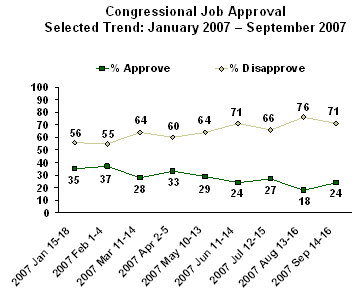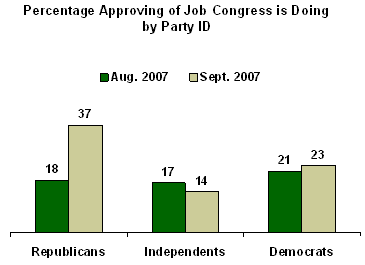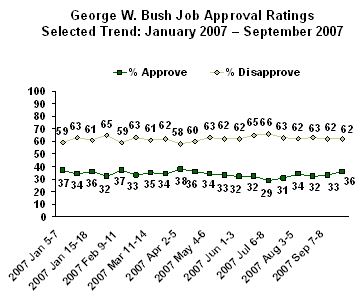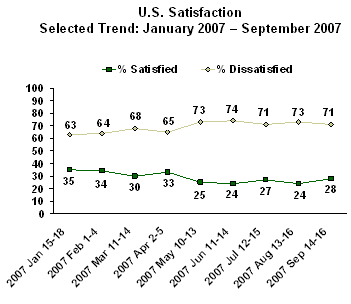GALLUP NEWS SERVICE
PRINCETON, NJ -- Gallup's 2007 polling from January through August chronicled a nearly relentless decline in public approval of the job Congress is doing. However, after sinking to a record-tying low of 18% last month, Congress approval has rebounded to 24% -- the largest one-month increase in support for Congress seen since the Democrats took majority control of the U.S. House of Representatives in January.

Nearly all of the recent increase is due to improved ratings of Congress among Republicans. The percentage of Republicans approving of the job Congress is doing rose from 18% in August to 37% in September. At the same time, there was only a two-point increase in approval among Democrats, and a three-point decline among independents (neither of which is statistically significant).

The Sept. 14-16, 2007 poll was conducted just days after Gen. David Petraeus, the commander of U.S. forces in Iraq, testified before Congress on the war in Iraq. It is notable that the House and Senate were in recess for most of August, and thus Petraeus' testimony on Sept. 10 represents the only significant news out of Congress for the period between Gallup's mid-August and mid-September surveys.
Although Democrats did their share of grilling Petraeus during his testimony -- and some questioned the general's independence from the Bush administration -- the very specter of Congress listening to Petraeus deliver his fairly upbeat report on the situation in Iraq may have warmed some Republicans toward Congress.
Meanwhile …
Other findings from the new poll indicate that the improved ratings of Congress are specific to that body, and not tied to a more fundamental improvement in the public's mood.
Americans' approval of President George W. Bush is now at 36%, the highest since April 2007, and slightly higher than his 33% job approval average since that point. An early September Gallup Poll found Bush approval at 33%, indicating there has been only a three-point increase in his approval score spanning Gen. Petraeus' testimony on Sept. 10. It has now been a full year since Bush last had an approval rating above 40%. (That was a 44% approval rating in September 2006.)

Public satisfaction with the direction of the country also remains close to where it was in August, increasing by a small, but not statistically significant, four points -- from 24% to 28%. It was nearly as high in July as it is today, but has otherwise been in the 24% to 25% range since May.

Bottom Line
Though improved, Congress' approval rating continues to be highly anemic, still registering on the extremely low end of the historical range of Gallup approval scores dating back to 1974. A Gallup Panel survey in August 2007 identified disappointment with congressional inaction as one of the public's leading complaints against Congress. Another -- mentioned mainly by Democrats -- is its failure to bring the war in Iraq to a close. Democrats' approval of Congress has barely changed since August -- suggesting neither of these concerns were alleviated over the past month. But, as noted, Republicans may have simply been pleased to see Petraeus given an attentive congressional audience for his message of staying the course in Iraq.
Survey Methods
Results are based on telephone interviews with 1,010 national adults, aged 18 and older, conducted Sept. 14-16, 2007. For results based on the total sample of national adults, one can say with 95% confidence that the maximum margin of sampling error is ±3 percentage points.
In addition to sampling error, question wording and practical difficulties in conducting surveys can introduce error or bias into the findings of public opinion polls.
